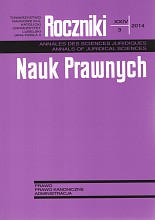Odpowiedzialność prawnokanoniczna lekarza za realizację obowiązków ustawowych zawartych w art. 39 ustawy o zawodach lekarza i lekarza dentysty
Canonical-legislative responsibility of the physician for the implementation of the statutory obligations contained in article 39 of the act on profes
Author(s): Michał CzelnySubject(s): Law, Constitution, Jurisprudence
Published by: Towarzystwo Naukowe KUL & Katolicki Uniwersytet Lubelski Jana Pawła II
Keywords: religious rights; conscience clause; Code of the Canon Law
Summary/Abstract: Article 39 of the Law of 5.12.1996 on the professions of doctor and dentist is that your doctor may refrain from performing health provisons being at odds with his conscience, subject to art. 30, he must obligatorily provide information on the possibility of this benefit from another physician or medicinal entity and justify and record this fact in the medical records. A doctor performing profession on the basis of his employment or in the service has a duty to inform the supervisor before-hand. The doctor can not take advantage of the implementation of the above legal standards, if the delay in giving medical aid could lead to danger of loss of life, serious injury or serious health disorder, and in other cases of urgency (see Art. 30 of the Act on professions of doctor and dentist). Accordingly, doctors can refuse to perform medical services incosistent with their formed medical conscience, referring to their religious and moral beliefs. The structure is called the conscience clause, which is in contradiction with the obligation referred to in Art. 39 of the Act on professions of doctor and dentist – for information on the possibility of such benefit from another physician or other medical entity. In this article, the attempt has been taken to answer the question: what is the physician’s canonicallegislative responsibility for implementation of statutory obligations contained in Art. 39 of the Act on professions of doctor and dentist? Does the physician apply any canonical-legislative penalty, and if so, what’s the refusal of benefits incompatible with his properly formed conscience while having statutory responsibilities? Are the statutory obligations of Art. 39 of the Act on professions of doctor and dentist inconsistent with morally unacceptable medical treatment? Considerations are limited to the problem on the basis of canon law, one of the obligations set out in Art. 39 of the Act on professions of doctor and dentist – obligation to provide information involving the refusal of a provision contrary to the conscience of the doctor (the conscience clause), at the same time informing the patient about the implementation of this provision from another physician or other therapeutic entity. Making the doctor liable to the duty to indicate the real possibilities to get health provisions from other doctor or a medical representative seems to be appropriate. The above-mentioned idea has been confirmed by the bioethics experts of the Polish Episcopate on the issue of conscience clause from 14 February 2014 which states: “to deny conscience clause would lead the situation, if the doctor refusing to comply with health benefits due to objection of con-science, was required to ensure the implementation of this provision by another, specifically designated medical or therapeutic entity where such provision is made. (...)
Journal: Roczniki Nauk Prawnych
- Issue Year: 25/2014
- Issue No: 3
- Page Range: 79-98
- Page Count: 20
- Language: Polish

